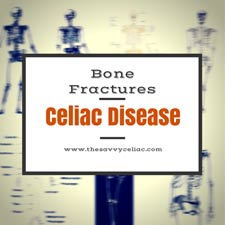 A new analysis of research is out and it reports increase instance of bone fractures with celiac disease.
A new analysis of research is out and it reports increase instance of bone fractures with celiac disease.
Instantly, when I saw this news today I thought it would be about people with undiagnosed celiac disease, because they may not be absorbing nutrients like they should. Undiagnosed celiac is mentioned in this study– but actually the report is about people with diagnosed celiac.
Bone Fractures with Celiac Disease
Researchers out of the University of Tampere, Finland and University of Nottingham, UK researched several past research on the subject, it is published in the Journal of Clinical Endocrinology and Metabolism.
ReutersHealth put it very clearly when reporting the findings, “In studies that looked at one point in time, people with celiac disease were almost twice as likely to have had a bone fracture in the past. In studies that followed people over time, those who had a diagnosis of celiac disease at the start were about 30 percent more likely to suffer a bone fracture and 69 percent more likely to have a hip fracture than others.”
But why? I have always thought bones were most likely to break before a celiac diagnosis. Researchers had a few theories as quoted from the study:
- “Celiac leads to dietary malabsorption and thus a deficiency in vitamins and minerals, including Vitamin D and Calcium”, crucial nutrients in bone health
- “Chronic intestinal inflammation and proinflammatory cytokines [nonantibody proteins released by a specific type of cell as part of the body’s immune response Medical-Dictionary.thefreedictionary.com], which interfere with bone formation could explain poor bone health…”
- “Hormone-related disorders associated with celiac disease”
- “Gluten-free diet, which is often low in minerals, impacting on bone health”
- “Mucosal autoimmune reaction in the small intestine could also impact bone formation by repressing bone formation and increasing bone resorption, thus making bones brittle and fracture prone”. In other words getting symptoms of osteopenia before seeing celiac symptoms in the gut
As for undiagnosed celiac and bone fractures, the researchers looked at the studies where people had the antibodies for celiac, and a bone fracture but not a clinical diagnosis. Researchers found more study was needed to conclusively say if not being diagnosed/treated for celiac increases the chances of bone breaks. Although loss of bone density and osteoporosis are well-known to contribute to bone fractures and also be symptoms of celiac disease, sourced by the Mayo Clinic, National Foundation for Celiac Awareness, and University of Chicago’s Celiac Disease Center.
Researchers also wanted additional study to be done on whether only specific areas of the skeleton are affected by celiac-related bone fractures.
Although not involved in the research, Peter Green, M.D. with the Celiac Disease Center at Columbia University talked to ReutersHealth about it. “Some areas of bone are more vulnerable to the damage induced by celiac disease….This relates to the type of bone and its rate of turnover,” he explained.
While Green points out in the article new patients are routinely given a bone density scan, I know my daughter didn’t get one when she was diagnosed — but that was more than 14 years ago now. Green also told Reuters Health, along with strict adherence to the gluten free diet, calcium and vitamin D supplements help with bone density.
So what can you do?
- Check with your doctor about getting a bone density scan after a celiac diagnosis
- Talk with your doctor about your vitamin and mineral levels and whether adding calcium and vitamin D to your diet or as supplements would help
- Be strict with your gluten free diet. If you are not faithful, it is conceivable that you could continue to not absorb nutrients making your efforts to improve your bone density fail.
You can read many, many more details on this research, by clicking here.
Tags: bone, break, celiac, density, diagnosis, disease, fracture, osteoporosis, research, study, symptoms



Leave a Reply